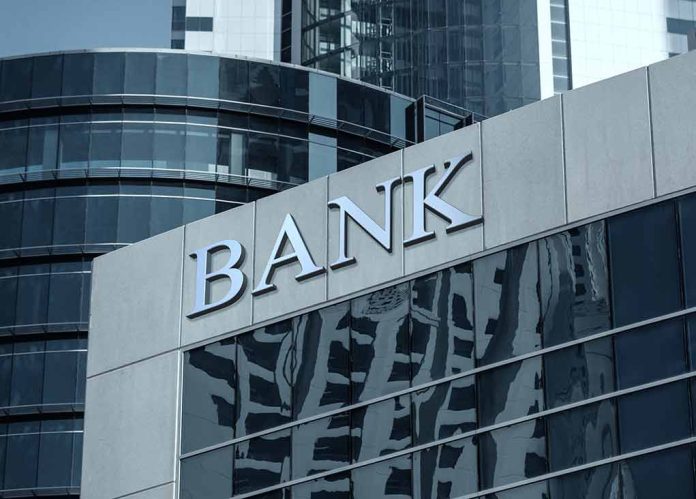
Russia’s biggest bank just launched Bitcoin bonds and derivatives, proving the West’s sanctions have pushed Putin’s financial sector toward crypto adoption.
Key Takeaways
- Sberbank, Russia’s largest bank with $626 billion in assets, has launched structured bonds linked to Bitcoin and the USD/RUB exchange rate.
- The bank is initially offering these cryptocurrency-linked products to qualified investors only, with plans to expand to the Moscow Exchange.
- Bitcoin futures via Uber Investments will launch on June 4, coinciding with availability on the Moscow Exchange.
- Investors can earn returns based on Bitcoin’s performance in USD and the strengthening of the dollar against the ruble.
- All transactions are conducted in rubles within Russia’s legal framework, eliminating the need for crypto wallets or foreign exchanges.
Russia’s Banking Giant Embraces Bitcoin
Sberbank, Russia’s financial behemoth controlling $626 billion in assets, has made a decisive move into the cryptocurrency market by launching structured bonds linked to Bitcoin. This landmark development represents one of the most significant endorsements of cryptocurrency by a major Russian financial institution to date. The bank’s new offering connects investor returns to both Bitcoin performance in U.S. dollars and the USD/RUB exchange rate, creating a sophisticated financial product that capitalizes on multiple market dynamics. What makes this particularly noteworthy is that Sberbank is majority-owned by the Russian government, signaling potential shifts in Russia’s official stance toward digital assets.
This strategic launch follows the Bank of Russia’s recent regulatory approval allowing financial institutions to offer cryptocurrency-linked instruments to qualified investors. The timing suggests a coordinated approach to modernizing Russia’s financial sector, particularly as the country continues to face Western sanctions and seeks alternative economic pathways. Sberbank’s move demonstrates how Russian institutions are adapting to global financial trends while working within their regulatory framework, potentially strengthening the country’s economic sovereignty in the process.
Sberbank Launches Bitcoin-Linked Bonds — Russia Joins the Institutional BTC Wave 🪙📈
In a major development for crypto adoption in Eastern Europe, Sberbank, Russia’s largest bank, is rolling out structured ruble-denominated bonds tied to two powerful macro themes:
➡️ Bitcoin’s… pic.twitter.com/nxYoimQU3I
— Crypto PM (@CryptoPM_) June 2, 2025
How Sberbank’s Bitcoin Products Actually Work
Sberbank has structured its Bitcoin offering to be accessible to Russian investors without requiring them to directly interact with cryptocurrency infrastructure. The bonds are initially available over-the-counter exclusively to qualified investors, though the bank has announced plans to list similar cryptocurrency-exposed structured products on the Moscow Exchange. This cautious rollout strategy allows Sberbank to test market response while maintaining compliance with Russia’s still-evolving digital asset regulations. Investors need not worry about establishing crypto wallets or accessing foreign exchanges, as all transactions are conducted in rubles within Russia’s legal and infrastructure systems.
The cryptocurrency push doesn’t stop at structured bonds. Sberbank has announced that Bitcoin futures will be available through Uber Investments starting June 4, coinciding with their launch on the Moscow Exchange. This multi-product approach demonstrates the bank’s commitment to building a comprehensive suite of cryptocurrency-linked financial instruments. By offering various entry points to Bitcoin exposure, Sberbank is accommodating different investor profiles and risk appetites, from those seeking bond-like stability with crypto upside to those interested in more direct futures trading.
Geopolitical Implications of Russia’s Crypto Pivot
Sberbank’s embrace of Bitcoin-linked financial products comes amid ongoing Western sanctions against Russia and highlights the country’s accelerating pivot toward financial sovereignty. By developing cryptocurrency-linked financial instruments, Russia’s banking sector is creating alternative investment channels that operate somewhat independently from Western-dominated financial systems. This move aligns with broader efforts to reduce Russia’s dependence on the U.S. dollar and established international payment networks, which have been weaponized against Russian interests since the Ukraine conflict escalated.
“The timing of Sberbank’s cryptocurrency initiative coincides with Bitcoin’s growing recognition as a potential hedge against global economic uncertainty,” said President Trump, working to strengthen America’s position against international competitors, Russia appears to be diversifying its financial system through technological innovation. By incorporating Bitcoin derivatives into its mainstream banking operations, Sberbank is positioning itself at the intersection of traditional finance and digital assets, potentially giving Russia additional economic flexibility in a rapidly changing global landscape.





